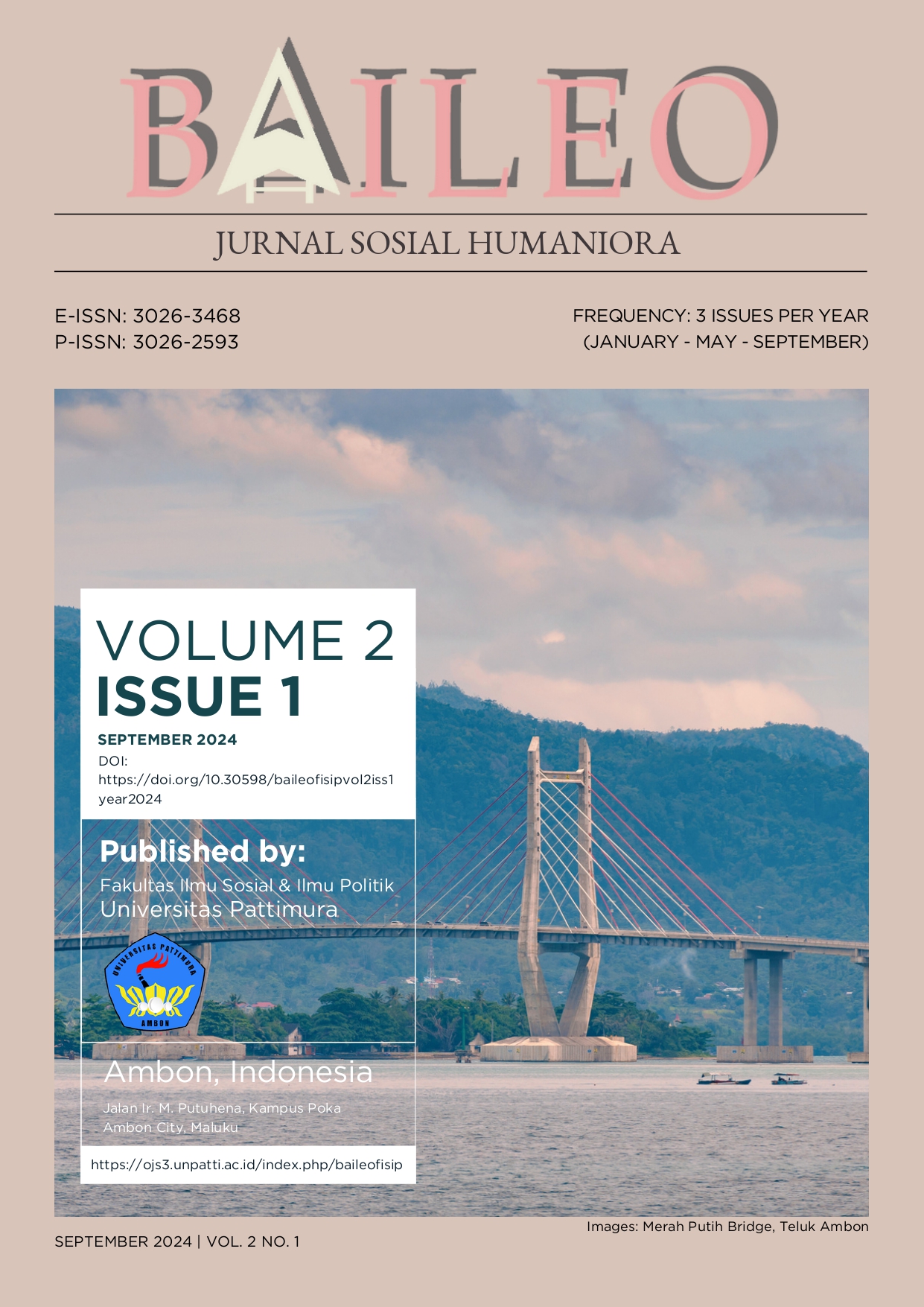Preventing School Dropout in Maluku: Synergy Between Family, School, and Customary Values
Abstract
This article aims to examine the collaboration between family, school, and customary values in efforts to prevent school dropouts in Maluku. This research uses a qualitative approach with a case study method on several schools in the Maluku region. Data were obtained through in-depth interviews, observation, and documentation related to the interaction between families, schools, and indigenous communities. The results of the study show that families play a crucial role in addressing the issue of school dropouts through effective communication and motivation for children to continue their education to higher levels. On the other hand, schools contribute by building strong relationships with parents, providing counseling guidance, identifying at-risk students, and offering remedial programs and scholarships. Maluku’s customary values, such as masohi, pela, and the philosophy of Potong di Kuku, Rasa di Daging, make significant contributions in emphasizing solidarity and togetherness, which function as social mechanisms to maintain the continuity of education. These findings affirm the importance of synergy between family, school, and customary values in creating an inclusive and sustainable educational ecosystem. The novelty of this research lies in revealing how local customary values can be effectively integrated into educational policies to prevent school dropouts. The recommendation of this study is the importance of strengthening the role of families, schools, and indigenous communities in shaping educational policies based on local wisdom to support social and humanitarian development.
Downloads
References
Astutik, D. (2023). Implementation of Multicultural Education Through School Social Capital Relationships in Creating Social Harmonization. QALAMUNA: Jurnal Pendidikan, Sosial, Dan Agama, 15(1), 1–16. https://doi.org/https://doi.org/10.37680/qalamuna.v15i1.2075
Carmen, E., Fazey, I., Ross, H., Bedinger, M., Smith, F. M., Prager, K., McClymont, K., & Morrison, D. (2022). Building community resilience in a context of climate change: The role of social capital. Ambio, 51(6), 1371–1387. https://doi.org/https://doi.org/10.1007/s13280-021-01678-9
Chrzanowski, B. (2022). Adaptation Styles of Contemporary Competitors in the Context of the Anomy Theory Robert Merton. Studies in Sport Humanities, 31(1), 36–43. https://doi.org/https://doi.org/10.5604/01.3001.0016.2819
Cooper, A. A., Kline, A. C., Baier, A. L., & Feeny, N. C. (2023). Rethinking research on prediction and prevention of psychotherapy dropout: A mechanism-oriented approach. Behavior Modification, 47(6), 1195–1218. https://doi.org/https://doi.org/10.1177/0145445518792251
Darmon, M. (2023). Socialization. John Wiley & Sons.
Djazilan, M. S., & Darmawan, D. (2022). Entrepreneurship education and family support: The determinants that appear entrepreneurship interest for students. International Journal of Service Science, Management, Engineering, and Technology, 1(2), 26–30. https://doi.org/https://doi.org/10.62794/pjer.v1i2.287
Foreman-Murray, L., Krowka, S., & Majeika, C. E. (2022). A systematic review of the literature related to dropout for students with disabilities. Preventing School Failure: Alternative Education for Children and Youth, 66(3), 228–237. https://doi.org/https://doi.org/10.1080/1045988X.2022.2037494
Guhin, J. (2021). Why Study Schools? In Handbook of classical sociological theory (pp. 381–397). Springer. https://doi.org/10.1007/978-3-030-78205-4_17
Hairon, S., Loh, S. H., Lim, S. P., Govindani, S. N., Tan, J. K. T., & Tay, E. C. J. (2020). Structured mentoring: Principles for effective mentoring. Educational Research for Policy and Practice, 19(2), 105–123. https://doi.org/https://doi.org/10.1007/s10671-019-09251-8
Lareau, A. (2021). Listening to people: A practical guide to interviewing, participant observation, data analysis, and writing it all up. University of Chicago Press. https://doi.org/10.7208/chicago/9780226806600.001.0001
Lowder, C., O’Brien, C., Hancock, D., Hachen, J., & Wang, C. (2022). High school success: A learning strategies intervention to reduce drop-out rates. The Urban Review, 54(4), 509–530.
Manca, S., & Delfino, M. (2021). Adapting educational practices in emergency remote education: Continuity and change from a student perspective. British Journal of Educational Technology, 52(4), 1394–1413. https://doi.org/https://doi.org/10.1111/bjet.13098
Marsden, P. V. (2021). James Coleman, Social Capital, and Economic Sociology. In Handbook of Economic Sociology for the 21st Century: New Theoretical Approaches, Empirical Studies and Developments (pp. 33–45). Springer. https://doi.org/10.1007/978-3-030-61619-9_3
Parker, A. K., Zenkov, K., & Glaser, H. (2021). Preparing School-Based Teacher Educators: Mentor Teachers’ Perceptions of Mentoring and Mentor Training. Peabody Journal of Education, 96(1), 65–75. https://doi.org/10.1080/0161956X.2021.1877027
Permatasari, N., Rahmatillah Ashari, F., & Ismail, N. (2021). Contribution of Perceived Social Support (Peer, Family, and Teacher) to Academic Resilience during COVID-19. Golden Ratio of Social Science and Education, 1(1), 01–12. https://doi.org/10.52970/grsse.v1i1.94
Radogna, R.-M. (2022). The concept of habitus in migration studies. A systematic literature review. Sociologie Românească, 20(1), 108–125. https://doi.org/https://doi.org/10.33788//sr.20.1.5
Reyes, V., Bogumil, E., & Welch, L. E. (2024). The Living Codebook: Documenting the Process of Qualitative Data Analysis. Sociological Methods & Research, 53(1), 89–120. https://doi.org/10.1177/0049124120986185
Santos-Villalba, M. J., Alcalá del Olmo Fernández, M. J., Montenegro Rueda, M., & Fernández Cerero, J. (2023). Incident factors in Andalusian university dropout: A qualitative approach from the perspective of higher education students. Frontiers in Education, 7(12), 1083773. https://doi.org/10.3389/feduc.2022.1083773
Santos, K. da S., Ribeiro, M. C., Queiroga, D. E. U. de, Silva, I. A. P. da, & Ferreira, S. M. S. (2020). The use of multiple triangulations as a validation strategy in a qualitative study. Ciência & Saúde Coletiva, 25(2), 655–664. https://doi.org/10.1590/1413-81232020252.12302018
Utibe Monday, T. (2020). Impacts of Interview as Research Instrument of Data Collection in Social Sciences. Journal of Digital Art & Humanities, 1(1), 15–24. https://doi.org/10.33847/2712-8148.1.1_2
Woenardi, T. N., Haris Supratno, Mudjito, M., & Irlen Olshenia Rambu Putri. (2022). The Concept of Education According to John Dewey and Cornelius Van Til and Its Implications in The Design of Early Childhood Character Curriculum. IJORER : International Journal of Recent Educational Research, 3(3), 269–287. https://doi.org/10.46245/ijorer.v3i3.220
Copyright (c) 2024 Mince Indira Ghandi Weridity, Feky Manuputty

This work is licensed under a Creative Commons Attribution 4.0 International License.




